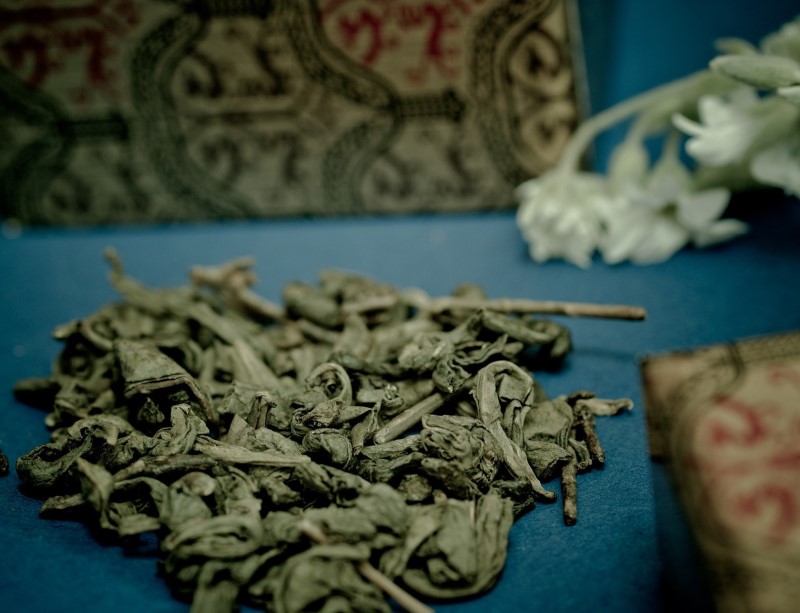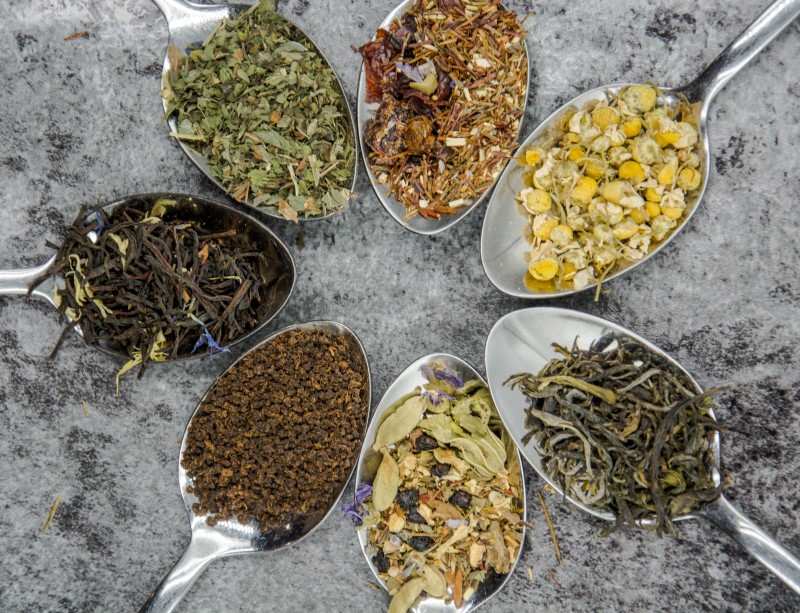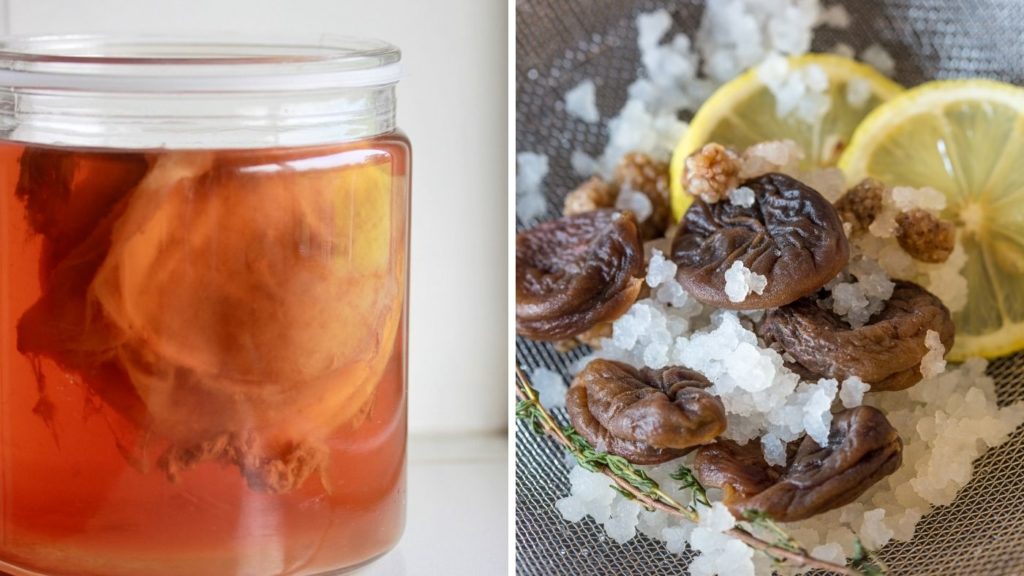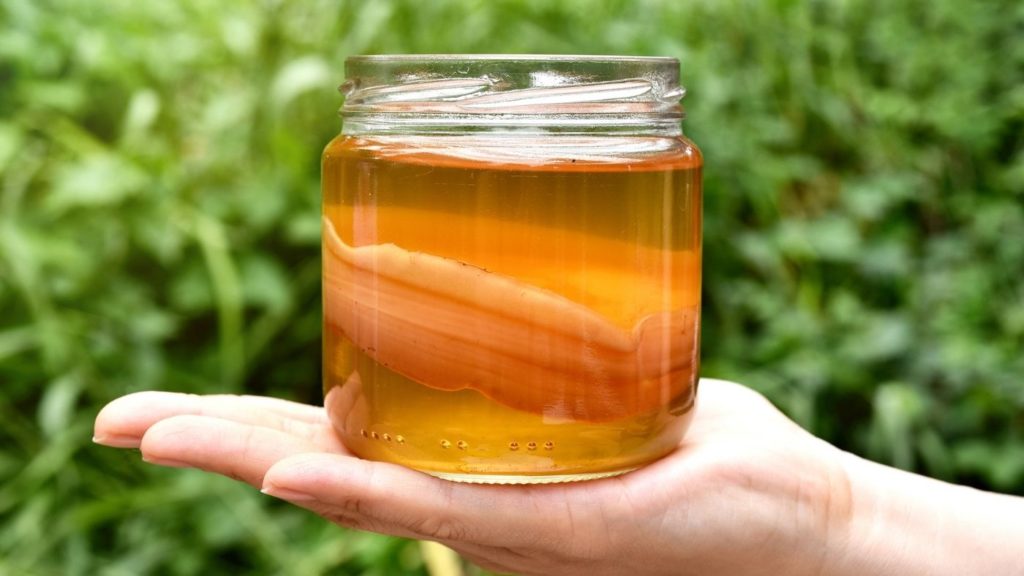Kombucha is fermented tea. To make kombucha, therefore you need… tea! This plant contains all the nutrients necessary for the successful development of kombucha culture.
Indeed, tea contains tannins, caffeine (often called theine), and many nitrogen components. This mixture of nutrients is ideal for bacteria and yeast to transform tea into kombucha.
The choice of tea has definitively an influence on the final taste of your favourite fermented beverage. This article will help you choose the right tea to make your kombucha.
Summary
- Making Kombucha With Black Tea
- Making Kombucha With Green Tea
- Using Other Teas for Kombucha
- How to Flavour Kombucha With Tea and Herbal Tea

Did you know that all teas (black, green, oolong, white, etc.) come from a single plant, the Camellia Sinensis shrub? The only thing that changes is the time of leaf picking and the processing techniques!
Making Kombucha With Black Tea
Black tea is an excellent choice for making kombucha. To produce black tea, the tea leaves are oxidized. This transformation creates all the necessary nutrients for kombucha microorganisms.
On the market, black tea can be found under several names: Darjeeling, Assam, Ceylon, English breakfast, Orange Pekoe, etc.
Black tea kombucha has a pleasant bitterness. We like to flavour it with fruits and citrus fruits, like in our clementine kombucha recipe.
Making Kombucha With Green Tea
Unlike black tea, green tea is not oxidized. Its taste is more subtle and herbaceous. Because it contains fewer components, green tea kombucha can be less sparkling than black tea kombucha.
Green tea can be found on the market under various names: Gunpowder, Sencha, Genmaicha, etc.
Green tea kombucha has a delicate taste, which goes very well with herbs and flowers (mint, verbena, lavender, etc.). For example, we enjoy it in our lime, honey and green tea kombucha.
Using Other Teas for Kombucha
There are many teas available on the market, and most of them produce very good kombuchas.
For example, Oolong tea gives a less bitter kombucha than black tea, but more robust than green tea kombucha. It is thus a well-balanced and affordable choice.
White tea, on the other hand, makes a very delicate kombucha. To be flavoured with rose or jasmine flowers.
Using Tea Blends
You can also mix different types of tea. For example, our organic kombucha tea blend produces a kombucha with harmonious flavours.
You can also make your tea blend by combining your favourite teas. Play with the quantities and brew a perfect kombucha to your liking!
Can I Make Kombucha With Herbal Tea?
Although tea is the best option, infusions and herbal teas can sometimes be used to make kombucha.
We are talking about herbal teas and plant infusions such as verbena, hibiscus, rooibos, mate, coffee…
This is generally not recommended, because the kombucha scoby could be affected in the long run if the chosen plant is not adapted to its health.
However, if you have a large number of kombucha scobies, or if you want to experiment, nothing is stopping you from trying! You could get great results.
As a matter of fact, in The Noma Guide to Fermentation, the authors experiment with verbena, coffee, and much more. Give it a try!

Herbal teas and infusions can be used to make kombucha, but we prefer to use them for flavouring.
How to Flavour Kombucha With Tea and Herbal Tea
Do you have a favourite herbal tea or flavoured tea that you’d like to turn into kombucha? Here’s how to make the most of it!
When fermenting kombucha, the tea loses much of its flavour. That’s why we don’t recommend using flavoured tea when making kombucha.
In addition, some flavoured teas contain compounds such as essential oils and artificial flavours, which can weaken the microorganisms in the kombucha scoby.
To avoid this situation, special teas are used to flavour plain kombucha.
- Make plain kombucha with green or black tea
- Let it ferment
- Remove the kombucha scoby
- Flavour the remaining kombucha with your favourite tea.
This is the technique used in our chai kombucha recipe. We start with a plain tea, then add the chai in the second fermentation, so we can fully enjoy its flavours.
This technique has several advantages:
- The taste of the infusion is more pronounced
- The kombucha mother does not retain the taste of a previous flavour
- The scoby is stable and healthy in the long run
By using these infusions only for flavouring at bottling, we always keep our scoby healthy!
To learn more, check out our article on How to Flavour Your Kombucha.

